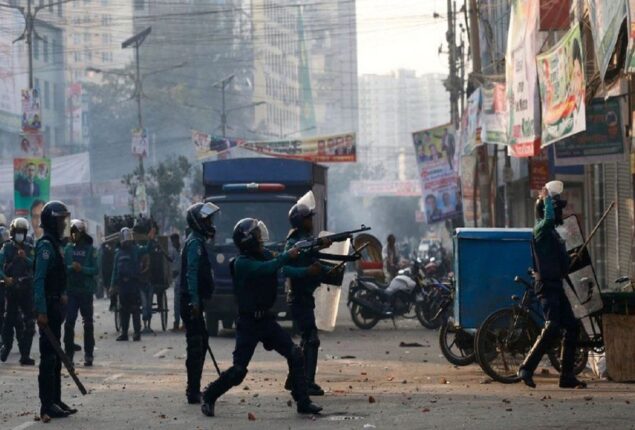
Bangladesh: Journalist held in underground cell for over a month
- I was zoo-treated, the journalist says.
- He was tortured for 53 days in an underground cell.
- They thrashed him before interrogating me.
Bangladesh: “I was zoo-treated. I was permanently blinded and only uncuffed to eat,” the journalist says.
Kajol, a Bangladeshi journalist, says he was tortured for 53 days in an underground cell.
“They thrashed me before interrogating me. It was unbearable.
“They asked about my writings. I was tortured. I can’t talk about it.”
The BBC can’t independently verify Kajol’s testimony; he’s never shared his experience so thoroughly.
The 54-year-old argues, “There are no human rights in this nation.” “I’m terrified.”
Kajol opted to talk to us the same week security forces clashed with opposition Bangladesh National Party (BNP) members in Dhaka, before large anti-government protests planned for Human Rights Day on 10 December.
The BNP is called for protests against Prime Minister Sheikh Hasina’s Awami League party. Concerns include free and fair elections, rising costs, and human rights abuses.
In the lead-up, police have detained opposition officials in an attempt to squash dissent, say critics.
Bangladesh denies limiting free speech.
Abdul Momen said protesters were gathering illegally in a BBC interview. His nation, formed in 1971 following a war with Pakistan, was founded “to protect democracy, human rights, and justice,” he said.
The UN expressed worry after Kajol disappeared in March 2020. A statement said the targeting of investigative journalists raises questions about Bangladesh’s commitment to a free and independent media.
Before he disappeared, Kajol wrote about a sex-trafficking ring including politicians. Soon later, his lawyer stated an Awami League member sued him and others for the report.
The next day, after dropping his son off at school, he left his workplace on his motorcycle and was followed by 8-10 males. Kajol says he was thrown into a minivan and transported underground.
Kajol reports being tied to a chair during interrogations. Why did you write about the scandal? It lasted 5-6 hours. It was awful.
Bangladesh’s home minister informed the BBC that Kajol was arrested for manipulating and posting images of females as harassment. “Those girls reported Shafiqul Islam Kajol to security. The next day, security officers apprehended Kajol and brought him to court.”
The government also rejected Kajol’s 50-day underground detention.
Human Rights Watch says it has evidence of covert detention sites in Bangladesh and has asked the government to investigate and free anyone detained there.
“We’ve heard they’re generally subterranean and dark. Some claim to hear torture. The organization’s South Asia director called it “extremely troubling.”
Government rejects them.
Months later, after being relocated to two additional cells in the same area, he was abandoned in a field near India, still blinded. After 13 appeals, he was released on bond in December 2020.
Kajol was prosecuted with defamation under Bangladesh’s digital security act (DSA), which criminalizes online criticism, including publishing a critical Facebook post. Since 2018 it has charged thousands.
Human Rights Watch said Kajol’s situation is typical of government repression.
Human rights groups say Bangladeshi security forces have “forcibly disappeared” 600 men since 2009.
72 enforced disappearance victims remain missing in the country, according to a 2022 UN report.
Foreign Minister Momen said the UN’s numbers were “politically driven.” Local groups “magnify” and “doctrine” data, he said.
Families waiting for loved ones to return say their stories are real.
Local BNP organizer Sajidul Islam Shumon was last seen in December 2013.
In January 2014, with the general election just weeks away, he briefly left home for his family’s safety.
Witnesses said Sajidul was handcuffed and blindfolded by the elite paramilitary Rapid Action Battalion (RAB) before being shoved onto a bus with a group of men.
His sister Sanjida saw him when he visited the family, especially his 1-year-old daughter Arwa.
Sanjida said, “It was cold in December, so I gave him a light blue hoodie.”
“I’ve given him everything. I’m not sure if he wore it.
Arwa, 10, kisses a photo of her father every time Sanjida shows it to her, asking when he’ll return.
Sanjida runs Mayer Daak, a support network for women who have lost brothers, husbands, sons, and fathers to enforced disappearances.
Many of the families have lost their sole breadwinner and are now poor.
Sanjida says she’ll join anti-government protests in Dhaka this weekend to seek justice.
Sanjida and other relatives said they tried to file complaints for missing relatives but were turned away unless they eliminated any reference to government security services.
Her mother, in her 70s and ill, went to the police station weekly to make a complaint for her son.
The family is hopeful.
We can’t tell if he’s alive until we know what happened.
Also Read
Read More News On
Catch all the World News, Breaking News Event and Latest News Updates on The BOL News
Download The BOL News App to get the Daily News Update & Follow us on Google News.




